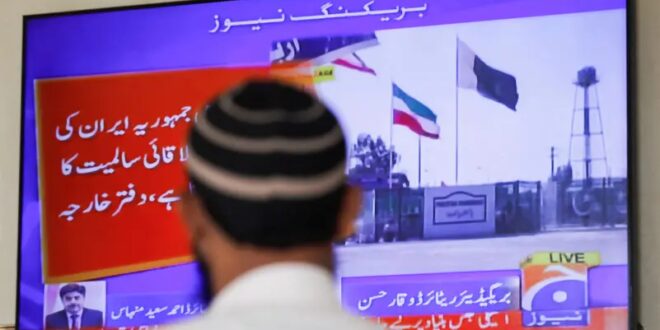Pakistan conducted lethal strikes inside Iran on Thursday, two days after Tehran attacked alleged Israel-linked militant bases on Pakistan soil.
Pakistan’s strikes resulted in women and children casualties, while Iran’s attack on Pakistan killed two children.
For all the latest headlines follow our Google News channel online or via the app.
Thursday’s strikes occurred in Sistan-Baluchistan province, with Pakistan’s foreign ministry claiming in a statement to have undertaken highly coordinated and specifically targeted precision military strikes against terrorist hideouts, resulting in the death of several terrorists.
When did the Iran-Pakistan attacks accelerate, and why?
The Iran raid on Pakistan came late on Tuesday after Tehran also launched attacks in Iraq and Syria against what it called “anti-Iranian terrorist groups.”
Iran’s Foreign Minister Hossein Amir-Abdollahian said Iran’s attack on “Pakistan’s soil” was a response to the Jaish al-Adl group’s recent deadly attacks on the Islamic Republic, particularly on the city of Rask in the southeastern province of Sistan-Baluchistan.
An attack on January 10 on a police station in the city killed one policeman, almost one month after 11 police officers were killed in a similar attack in the area. Both attacks were claimed by Jaish al-Adl (Army of Justice), a Sunni Muslim extremist group that was formed in 2012 and is blacklisted by Iran as a “terrorist” group.
What is the Jaish al-Adl group?
Jaish al-Adl (JaA) is an extremist Sunni militant group, an offshoot of Jundallah, founded by Abdolmalek Rigi around 2002. Led by Rigi until his execution in 2010, JaA emerged as a prominent splinter group in 2012. Operating in southeastern Iran and western Pakistani Balochistan, the group claims to seek greater rights and better living conditions for ethnic minority Baluchis. It has been designated as a “foreign terrorist organization” by the US State Department, along with its precursor Jundallah.
Pakistan’s retaliation against Iran
On Wednesday, a day after Tehran struck the alleged bases of a militant group in Pakistan, an officer from Iran’s Islamic Revolutionary Guard Corps (IRGC) was shot dead in the country’s restive southeast.
Colonel Hossein-Ali Javdanfar was shot dead in Iran’s Sistan-Baluchistan province, state news agency IRNA reported, describing the incident as a “terrorist” attack.
It said efforts were underway to identify the attackers.
Some 24 hours later, Pakistan’s air force launched retaliatory airstrikes early Thursday on Iran, allegedly targeting militant positions. This attack killed at least seven people and further raised tensions between the neighboring nations.
Iranian media said several missiles hit a village in the Sistan-Baluchistan province that borders Pakistan, killing three women and four children, all non-Iranians.
Worldwide condemnation
The United States on Wednesday condemned the Iranian strikes in Pakistan, Iraq and Syria.
“So we do condemn those strikes. We’ve seen Iran violate the sovereign borders of three of its neighbors in just the past couple of days,” State Department spokesman Matthew Miller told reporters at the time.
Pakistan denounced the strike near the nations’ shared border, recalled its ambassador from Iran and blocked Tehran’s envoy from returning to Islamabad.
What happens now?
The strikes jeopardize diplomatic relations between Iran and Pakistan, with both countries historically suspicious of each other due to militant attacks. The potential for escalation also remains on Thursday as Iran plans to initiate its scheduled annual air defense exercise, Velayat 1402, commencing from the Chabahar port near Pakistan and extending across the southern regions to Iraq. This drill will involve live-fire activities, encompassing aircraft, drones, and air defense systems.
Spanning a 900-kilometer (560-mile) border characterized by lawlessness, Iran and Pakistan face ongoing challenges with smuggling and militant activities. This porous boundary also serves as a critical route for global opium shipments originating from Afghanistan.
The cross-border attacks raise concerns for both Iran and Pakistan, prompting a reassessment of the readiness of their respective military forces, with a particular focus on radar and air defense capabilities.
The situation also adds to the existing tensions in the Middle East, marked by Israel’s conflict with Hamas in the Gaza Strip in addition the Houthi attacks on ships in the Red Sea.
 Eurasia Press & News
Eurasia Press & News



